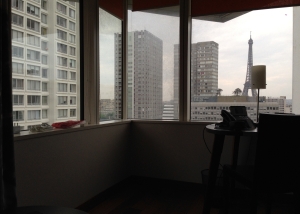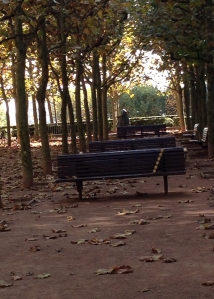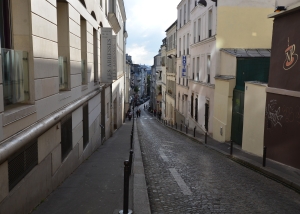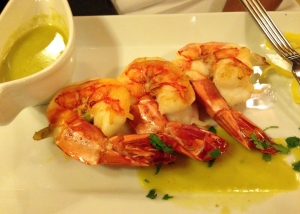 The coffee was turning cold. You could see the coffee stain beginning to form where the black liquid met the ceramic. With each passing minute, evaporation and capillary effect would only make the stain darker. The cheap coasters, the kind you get at innumerable souvenir shops, were strewn on the circular glass topped table in a haphazard manner. These had various landmarks of Paris printed on them, but he was not sure where and when they were bought. They also had smudges on them, probably from some previous spills, and somehow debasing the black java. The only patio furniture that the balcony could fit was a folding bistro set of two chairs and a small table, and his usual position on a languid weekend afternoon was to be propped up on a chair, coffee at arm’s length and a Kindle to give company. The one remaining piece of furniture on the balcony, if you can call it that, was a tall green plastic plant, placed at one corner and thankfully occupying a space that would otherwise not be usable.
The coffee was turning cold. You could see the coffee stain beginning to form where the black liquid met the ceramic. With each passing minute, evaporation and capillary effect would only make the stain darker. The cheap coasters, the kind you get at innumerable souvenir shops, were strewn on the circular glass topped table in a haphazard manner. These had various landmarks of Paris printed on them, but he was not sure where and when they were bought. They also had smudges on them, probably from some previous spills, and somehow debasing the black java. The only patio furniture that the balcony could fit was a folding bistro set of two chairs and a small table, and his usual position on a languid weekend afternoon was to be propped up on a chair, coffee at arm’s length and a Kindle to give company. The one remaining piece of furniture on the balcony, if you can call it that, was a tall green plastic plant, placed at one corner and thankfully occupying a space that would otherwise not be usable.
It was a hot, muggy afternoon in late August, not completely uncommon for that time of the year. The gentle breeze that was blowing in the morning also seemed to have stopped completely and a predicted thunderstorm the next day did not alleviate the present stickiness. Cross-ventilation is one of the life-savers in such small Parisian apartments, but that was not doing the trick this day. The dual power of the table fan and the pedestal fan too did not seem to be able to alleviate the undoings of the uncomfortable vapid weather.
The balcony overlooked the edge of the Bois des Boulogne, the second biggest park of Paris. He had rented this apartment with the belief that the trees and greenery would make the temperature bearable during the summer months, but today belied all such expectations. Not a leaf seemed to stir. There were a few brave souls in jogging gear trying to keep healthy, but the heat seemed to sap the energy of most of the rest. Even the squirrels, who would otherwise be very active, darting from one branch to another, lay still and anemic, uncharacteristically bored and spiritless.
But AK’s mind was in turmoil. Staring blankly at the trees but not really noticing them, forgetting the coffee, unmindful of the general oppressiveness of the weather, he was thousands of miles away in a small village in Azamgarh, in the state of Uttar Pradesh in India. He was not even sure why this discomfiture. Maybe because of the dream where his grandmother, or Nani as he used to call her, suddenly appeared on his bedside yesterday night and lovingly caressed his forehead, asked about his welfare, talked a bit about this and that and wondered if he could visit the village where she lived. And then she bade goodbye. It was not an ominous dream — just an motley collection of odd thoughts remembered as a sequence of images. But it was strange because he had never dreamed about Nani before, not even once in the nine years since he had left India for other shores. He called his father on the phone early the next morning, who assured him that Nani was fine and doing well, and that the next time he was in the village, he would connect them on Skype for a video chat. Amazing that even remote villages in India could now connect to the internet.
*****************************************************************************
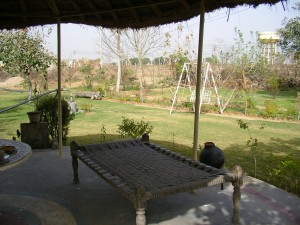
Nani nowadays spent most of her time on the wooden charpouy with a netting of light rope. Most of the village had switched to tape netting, but she preferred rope to tape as it helped with her back pain. The charpouy had a few permanently placed items: a thin cotton mattress that had to be aired once a year to prevent lumping, a striped bedcover to go with the mattress, a pillow with interchangeable covers, and a patchwork quilt placed near the foot, irrespective of the weather or season. People had tried to convince Nani to shift to a more comfortable bedding or seating arrangement, but she had resisted, successfully so far. The only allowance to modernity was the bed that she slept in at night, with Dunlop latex mattress brought all the way from Azamgarh.

No one knew her age. When asked (and people do not have the same social inhibitions as in the towns and cities), she would smile sweetly and say that she did not know. All that her mother had told her was that she was born on the night of the full moon and that it was raining heavily the past few days and nights, so much so that the mud road connecting to the nearest town had washed away. Adding two and two together, even though she had never seen the inside of a classroom, she guessed she was born on or around Rakhi Purnima in the month of August. As for the year, it was probably in the 1940’s as she remembered celebrations as a child on India attaining independence in 1947. She was therefore in her early to mid seventies, give or take a few years.
Her schedule would usually be packed. No weekends, no days off. She was a morning person and even at her age, or perhaps because of it, she would rise at dawn, and for the next six hours, busy herself propitiating the God of the day. On Tuesdays it would be Hanuman, Thursdays Goddess Laxmi, Fridays Santoshi Mata and Saturdays Goddess Kali. There would also be sacred events and celebrations that necessitated keeping a fast from morning till the conclusion of the event. Earlier, she used to abstain from eating meat on Mondays, but now that was no longer an issue as with age she had turned completely vegetarian. She had a special Puja (prayer) room where idols and framed pictures of her preferred Gods and Goddesses were displayed. The pride of place was taken by Sri Sri Satyanarayana, who had a throne of His own, and who had an elaborate prayer sessions held in His honor every alternate month for which most of the village would be invited.

With the entire morning taken over by Puja, and which included dressing the deities, cleaning the utensils, preparing the prasad, and other hundreds of small acts that Nani did not allow anyone else to do, she would be able to take the first sip of what is the average person’s morning cup of sweetened milk tea only at around noon. This meant that the actual lunch hour for her would slide down to between 2:00 and 3:00 PM. The next couple of hours would be spent doing a little bit of this and that. She was an expert in preparing different types of pickles, sweet, sour or hot, and depending on how fast the existing bottles were being consumed, she would make a decision on when she needed to make a fresh batch. On other days she might be knitting a sweater for one of her grandchildren, or gossiping with her few remaining friends, though this was one activity that she was not very comfortable with. Rarely, but with increasing frequency in recent days, she would take a quick nap in her charpouy, and depending on the season, it could be either in the shade of the verandah or in the courtyard underneath the bough of a neem (Azadirachta indica) tree. She had heard people say that the neem tree was planted as a sapling by her father when he had expanded the house from what was initially only a mud structure, and considering that these trees can live between 150 and 200 years, it could well be true. But the truly delightful activity that she reveled in would take place daily in the evenings after the children returned from school, the cattle were locked up in their barnyards, housewives became busy with preparing dinner and the men smoking, drinking, chatting after a hard day’s work in the fields.
For you see, Nani was a charmer par excellence in story-telling. She could construct a story out of anything, even subjects as mundane as, perhaps, today’s news, but she would be in her elements when talking about history. Kings, queens, princes, princesses, demons, elephants, tigers, Gods, asuras, flying chariots, dark forests, murmuring streams, saints, wizards and what have you — each took a life of their own and came alive as she narrated their story. Every evening she would lie on her charpouy, surrounded by eager little kids, cajoling her to tell a story that they had not heard before, and she would oblige. Every evening eager young kids would come hurrying along to her bedside, intent to know what happened in the next installment of the fight between the Pandavas and the Kauravas, or between the demon-king and Dhruva, or the delicate princess and the mighty lion. Nani held everyone of her followers spellbound, and mythology, fairy tales, epics and all other stories were just tools in her hands — she used the story lines as a base to create a world of her own, where each member of the bewitched audience remained enraptured till the very end of the session or till their mothers called out to come home and finish dinner.
Nani had the same routine for almost twenty five years. Ever since she retired to the village after the demise of her husband, she had taken upon herself the role of the village story-teller with gusto. Not a single kid in the village could escape her charm — and no one wanted to. It is said that she never ever repeated her story, but that can safely be relegated as the uttering of her over-zealous army of supporters. Be what it may, she had a way of imbibing into the children the value of good over evil, of morality over wickedness, of virtue over vice that no amount of theological study could ever hope to attain.
Nani was feeling quite tired today. In fact, the tiredness in her body was something that seemed to have embraced her since the last one month or so. It was not something that she could quite pin her hands on. It was just a sort of vague ache that was not really a specific pain somewhere but a kind of general weariness that comes with age. It was more of a general envelop of sadness that did not seem to have any reason or cause. No one could see it, test it , describe it and yet she knew she had it. She needed to rest more often and very surprisingly, the last few story-telling sessions had left her completely drained out. She decided that she would discuss her ailment with the village doctor, or Vaidhji, as he was locally known. He was an excellent physician and his tonics had been known to put life back into persons being taken to the open crematorium. Well, not really that, but that is how well regarded he was.
****************************************************************************
AK’s eyes began to water for no apparent reason. He was missing India, his parents, his village, his friends and his Nani. It was two years since he had last visited them, and even in his last visit there, and in spite of the promise he had made to himself, he could not make time to visit the village where his Nani lived. The measly two weeks of leave and critical work related to banks, taxes and certificate notarization, that could only be done from the town where his parents stayed, had put paid to any hopes of somehow extracting a couple of days to be able to visit her. And it was not as if visiting her was easy. A three hour journey in a rickety transport on a pothole filled road followed by the last mile on foot was not something one would look forward to, particularly when it seemed like vacation days were being doled out in hours, not days. And even after reaching the village, it was not as if a huge party would be welcoming him. Most of the kids he grew up with were either not there or so far removed from his life that it would be impossible to re-bond in a short span of a couple of days. The only constant would be Nani, but in today’s cut-throat competitive world, her world of fairy tales and magic and morality was getting fainter day by day.

He decided to apply for leave during the Durga Puja celebrations when eastern India donned a festive look like no other place he had seen. For five whole days and nights cities across the East would be filled with laughter, gaiety, new clothes, jewellery, festooned streets, dazzling lights, rhythmic beat of the dhak (drums), intonations chanted by the head priest and blared over loudspeakers, streetside plays, temporary roadside eateries selling a variety of mouth-watering dishes and suspiciously guarded booths where some adults would disappear for a few minutes to get a swig from a bottle of locally distilled whisky. Entire roads would be blocked to accommodate pandals that housed the idols of Goddess Durga, who was visiting Earth for five days, along with her sons Ganesh and Kartik, and daughters, Laxmi and Saraswati, who were Gods and Goddesses in their own right. There was a beautiful story about how Ganesh, the elephant headed God, came to such a state and AK remembered how Nani had woven the entire story on a starry sky under the neem tree one night many years ago. The story still seemed fresh to him, as if it had just happened the other day — such was the power of Nani’s story-telling capability.
And what to say about the decorative ability of the local artisans? Each pandal would have a theme decor that gave free range to the artists to dream. He remembered when as a young student he had visited Kolkata once and was amazed to see the High Court building in the middle of Middleton Street — such gracefully constructed was the canopy. There were others that had themes ranging from Sachin Tendulkar (cricketing icon) to the movie Avatar to Mount Kailash (Lord Shiva’s abode in the Himalayas) to innumerable others. He recalled that he spent the better part of the entire night walking from one locality to another, each having its own Puja, and each brimming with people — young, old, middle aged, rich, poor, fashionistas, unkempt, stylists, ungroomed, and all other categories in between. He had never seen such a wonderful melting pot of humanity where race, creed, caste, wealth, appearance all became irrelevant. To him, this was the actual magic, the power of Ma Durga, and all the rituals and invocations to propitiate her were meaningless.
AK confirmed his flight through Qatar Airways. It had a flight to Kolkata and it allowed 30 kgs of baggage to be checked-in as opposed to 20 kgs of most other airlines. He would be able to kill two birds with a stone. He would spend a few days during Durga Puja in Kolkata, and this time he would be armed with an entry level DSLR to capture the mood of the city. The additional baggage weight would allow him to carry presents for those he would meet. Importantly, he would be able to carry a cuckoo clock for Nani, who had once confided in him that it was something she would very much like. He wanted to capture his Nani in his camera as she opened her present and exclaimed in delight. It would be a fascinating couple of weeks — first the Puja in Kolkata, then with his parents at Azamgarh, and finally his village where he had spent the first seven years without any worries of any kind except plans on how to escape from the house and pluck unripe mangoes from the neighbor’s trees on hot summer afternoons.
*****************************************************************************

Nani could feel the mesmerizing Sharad, the early autumn season of the Hindu calendar, in her soul. The clear blue skies after three months of intermittent rain, the luxuriant green of the grass in place of muddy puddles, the clean fresh air, as if it itself had been scrubbed clean of all its polluting particles, the birds showing off their magnificent plumage instead of being wet and miserable, the season of festivals with Navaratri, Vijayadashami (the tenth day of Durga Puja) and Sharad Purnima, among others, all sent a pleasing thrill up her spine. What a wonderful way of Nature, she thought, to cleanse the worn-out, weak and inefficient and bring in the new, young, fit for a fresh cycle of hope. Maybe this is what eternity was. One need not live for ever, in her understanding of eternity. All that it was an ever-repeating cycle of Nature where seasons came and went, flowers bloomed and faded, the aged departed and the young were born. The cycle was eternal — the individual was not.
The monsoon had really sapped her energy. She felt old, tired, useless. The last couple of months had been especially trying with the general feeling of lethargy difficult to shake off. The Vaidhji had come one day, had a hearty chat and an equally hearty breakfast, prescribed some tonic and vitamin, and asked her to take it slow. He had also said that there was a dirty viral infection that was going around and she needed to make sure that the water she drank was always boiled. Other than that, she was in fine fettle for someone of her age. The onset of Sharad seemed to give her some of her bounce back, though it was more mental than physical. She still spent most of her time on the charpouy, laid out under the neem tree, but would often doze off even during her story-telling sessions, something which had never happened before. And there was another thing that was a first for her. Yesterday night she had dreamt that AK had come to visit her, here in this village, and they were sitting on her charpouy and he was regaling her with tales of far-off lands and his experiences of life with Sahibs and Memsahibs (white men and women). For the first time in recent memory, she was the kid listening with rapt attention to someone else’s tales. She screamed in excitement when she opened the gift that AK brought for her — he had remembered that she had once mentioned a cuckoo clock. And then she woke up.
She felt especially tired today. It was past 8:00 PM. The kids had all returned to their mothers. Someone came and asked her if she wanted to move inside, but she wanted to lie on the charpouy for some more time. The clear night sky with thousands of stars stared at her with twinkling eyes, conversing with a dear old friend of yore. The half-crescent moon, on its journey across the heavens, seemed stuck at one end of a neem branch. Shafts of moonlight filtered through the leaves of the tree. The absolute silence, the half-darkness half-moonlight ambiance, the gentle breeze with a fragrance undefined and the luminescence of the night sky seemed to invite her to a distant land of peace, tranquility and serenity. She smiled at her messengers of friendship, gave a contented sigh, and dropped off to sleep.












